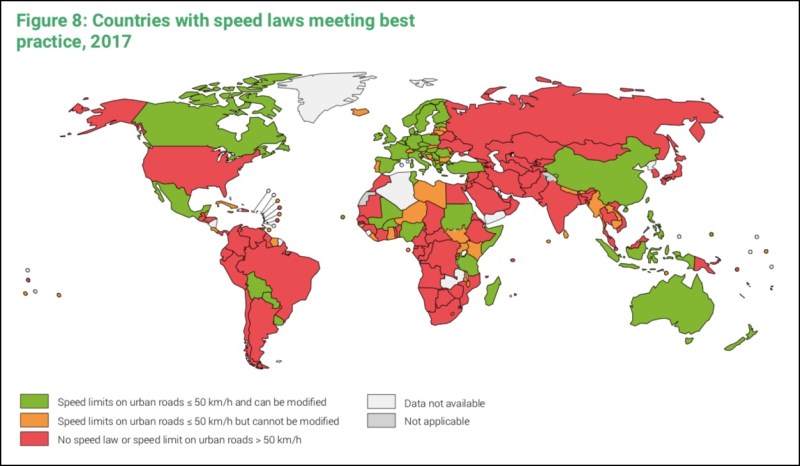A new report on global traffic deaths illustrates exactly why the U.S. trails the developed world on traffic safety: we drive too much and our laws are too permissive of deadly behavior.
The global report from the World Health Organization — which reviewed laws and crashes in 175 nations — explains that U.S.'s traffic fatality rate is 12.4 deaths per 100,000 -- or about 50 percent higher than similar nations in Western Europe, plus Canada, Australia and Japan.
About 1.3 million people are being killed globally by traffic crashes every year, a huge proportion of them pedestrians. Traffic deaths are now the leading cause of death globally for those between the ages of 5 and 29.
Previous studies have revealed how much more driving Americans do, with roughly 8,800 kilometers per capita, versus 4,300 in Canada, 7,000 in Germany and less than 1,700 in Japan.
But the World Health Organization's international comparisons show the United State's safety policies are seriously out of line with the rest of the developed world. Here's a look:
Bad seat belt laws
U.S. law does not require seatbelt use in the back seat, unlike the overwhelming majority of the world. Seat belts decrease injury and death risk by 50 percent in the front seat and 25 percent in the back seat, according to the U.N. health organization.
The U.S.'s seat-belt-wearing rate has improved to 90 percent. But peer nations are doing better. In Canada, the seat belt wearing rate is 95 percent. That means our non-compliance rate is double that of Canada.
Drunk driving laws
Our drunk driving laws are also too lenient compared to peer nations and compared to WHO recommendations. Many studies have shown that driving is impaired at lower blood alcohol concentration levels than 0.08. WHO recommends enforcing drunk driving laws at a low 0.05 BAC, like most of Western Europe, plus Canada, Australia, Brazil and China.
Canada, for example, also imposes stricter penalties on drivers caught violating the law. Some of the countries, like Sweden, with the best traffic safety records, control alcohol sales strictly.
Car standards
The U.S. also lags world leaders in vehicle safety, falling short of the standards established by United Nations. We have reported extensively, for example, about how the U.S (under Trump) has resisted adding safety features to vehicles that would help protect pedestrians in crashes, even as their fatality rates soar.
Speed demons
Finally, the U.S. fails to control driver speed as well as other nations. For speed control laws to work even moderately well, the WHO says urban street speeds must be strictly limited to about 31 miles per hour. In the U.S., localities often can't adjust their speed limits but need state-level permission, another red flag for WHO. Worse, many localities don't even start handing out tickets until drivers exceed the posted speed limit by more than 10 mph.
Canada, Western Europe, Australia, even China and Mexico have stricter controls on speeding than we do. Some safety officials in the U.S. like the National Transportation Safety Board have sounded the alarm that lack of progress on speeding is a major factor in the U.S.'s deteriorating traffic safety record. In recent years, we've actually gone backward with 30 states raising speed limits on highways to 70 mph since 1995, often with deadly results.
The WHO's 2018 Global Status of Road Safety report highlights other safety failures as well. Our motorcycle helmet laws are worse than Russia and India. Our child restraint laws, which only apply to children until age 4, are more lenient than the WHO recommends and worse than all of Western Europe.
The findings comport with what Canadian traffic safety expert Neil Arason told Streetsblog about why Canada's traffic safety record is so much better than the U.S. Our laws are just too lenient — we value "freedom" over safety (people's lives) — and we don't have enough alternatives to driving, like high-quality urban transit.






